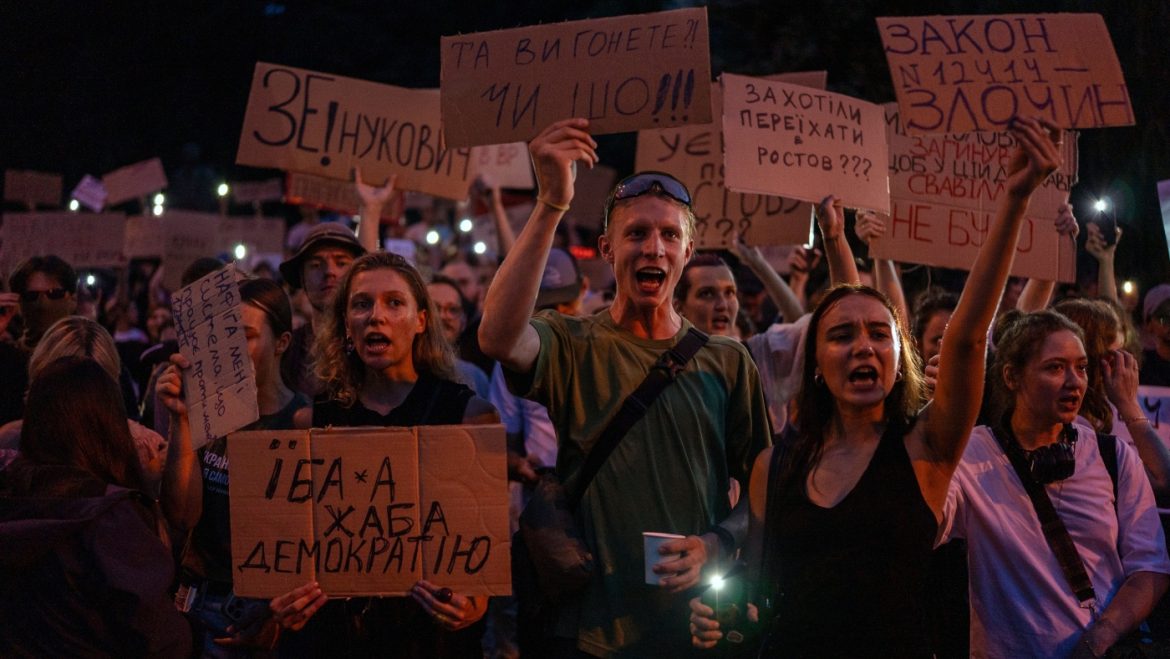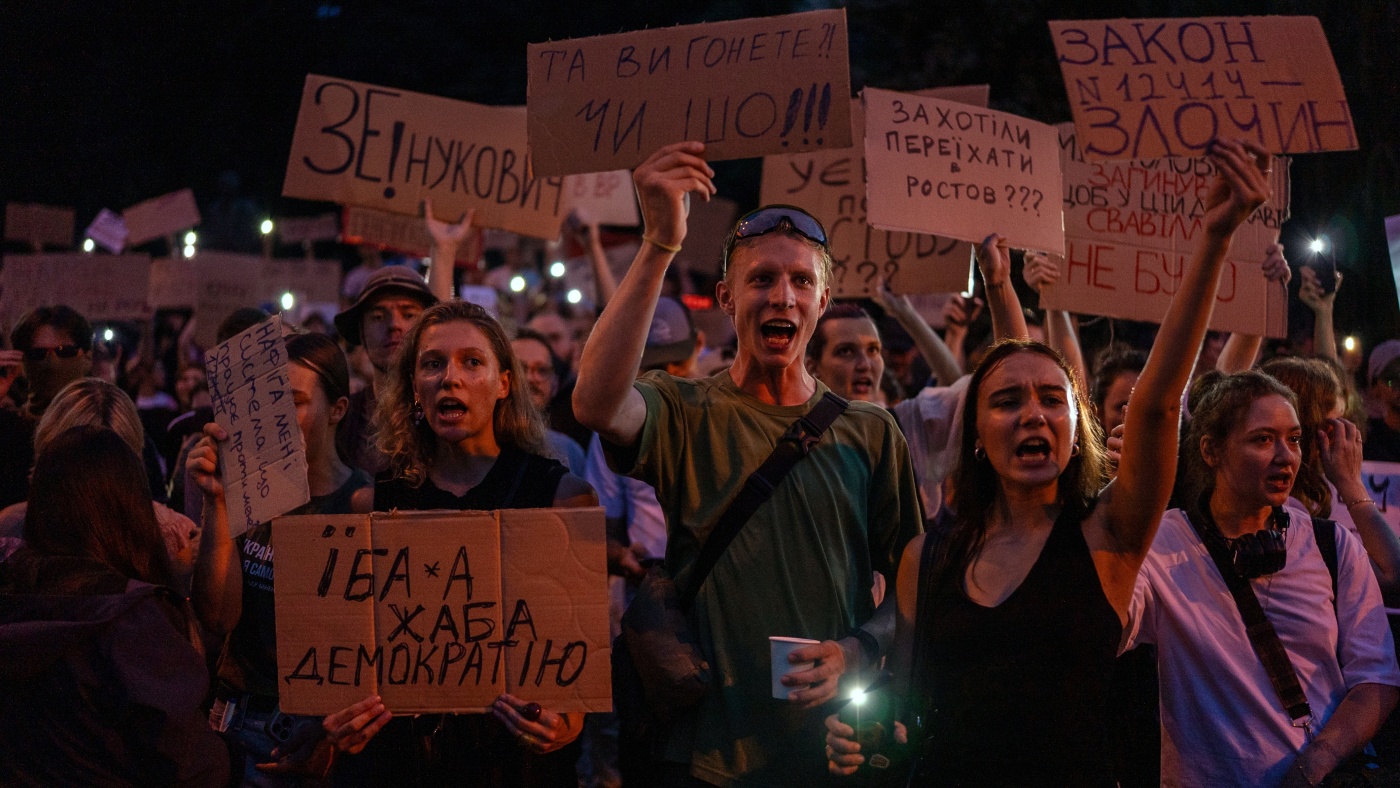The Storm in Kyiv: Unraveling Zelenskyy’s Anti-Corruption Dilemma
Introduction: A Leader at a Crossroads
Volodymyr Zelenskyy, the charismatic leader who captured global admiration for his steadfast leadership during Ukraine’s war with Russia, now faces an internal storm. The passage of a controversial bill perceived to weaken Ukraine’s anti-corruption agencies has sparked widespread protests and drawn sharp criticism from both domestic activists and international allies. This move, intended to streamline anti-corruption efforts, is seen by many as a dangerous retreat from crucial reforms, potentially jeopardizing Ukraine’s future and its aspirations for European Union membership. As Ukraine navigates the complexities of war and reform, this controversy highlights the delicate balance between national security and democratic principles.
The Controversial Bill: A Closer Look
The heart of the controversy lies in a bill passed by Ukraine’s parliament and signed into law by President Zelenskyy. This legislation targets two key anti-corruption bodies, the National Anti-Corruption Bureau of Ukraine (NABU) and the Specialized Anti-Corruption Prosecutor’s Office (SAPO), focusing on the selection process for their leadership. Critics argue that the changes introduced could significantly undermine the independence of these agencies, making them more susceptible to political influence.
The bill’s proponents argue that the reforms are necessary to address inefficiencies and ensure that the agencies operate effectively. However, the rushed nature of the bill’s passage, with little public consultation, has fueled skepticism. The changes are seen as a potential tool for political interference, allowing President Zelenskyy’s circle to exert greater control over investigations. This raises concerns about the agencies’ ability to operate without fear of reprisal, a critical aspect of their effectiveness.
Public Outcry: Protests and Disillusionment
The signing of the bill has triggered widespread protests across Ukraine. Thousands of citizens have taken to the streets, expressing their discontent through chants and banners. These protests are not merely localized events; they represent a groundswell of public opposition to what is seen as a betrayal of Zelenskyy’s promises of transparency and accountability.
Beyond the visible demonstrations, there’s a palpable sense of anger and disillusionment. Activists, civil society organizations, and even some members of parliament have voiced strong condemnation of the law. They argue that it represents a significant setback to Ukraine’s reform efforts and could erode public trust in the government. The timing of the bill is particularly sensitive, given the ongoing war with Russia. Maintaining public trust and unity is paramount in such a challenging context, and this controversy risks fracturing that critical foundation.
Zelenskyy’s Defense: National Security and Efficiency
In response to the mounting criticism, President Zelenskyy has attempted to defend his decision. He argues that the changes are necessary to streamline the anti-corruption process and ensure that these agencies operate effectively. He suggests that corruption cases have been taking too long to investigate and that the agencies themselves may have become compromised. He further claims that the reforms are intended to ensure that the anti-corruption infrastructure operates free from Russian influence.
However, this justification has failed to quell the criticism. Many view Zelenskyy’s arguments as disingenuous, pointing out that the bill was rushed through parliament with little public consultation. Critics argue that rather than making the agencies more efficient, the bill will make them more vulnerable to political interference, potentially stalling or derailing investigations into high-level corruption.
International Repercussions: A Threat to Western Support?
The controversy surrounding the anti-corruption bill extends beyond Ukraine’s borders, raising concerns among its Western allies. These nations have invested significant resources in supporting Ukraine’s reform efforts, including the establishment and strengthening of anti-corruption institutions. The new law is seen by many as a direct threat to these efforts, potentially jeopardizing future financial and political support.
The European Union, in particular, has been vocal in its criticism of the bill. Ukraine’s aspirations to join the EU hinge on its ability to demonstrate a commitment to the rule of law, democratic principles, and the fight against corruption. The weakening of anti-corruption agencies could significantly hinder Ukraine’s progress towards EU membership, undermining its long-term strategic goals.
The Path Forward: Damage Control and Future Prospects
Faced with mounting domestic and international pressure, President Zelenskyy has promised to introduce a new plan to combat corruption. The details of this plan remain unclear, but it is likely to involve efforts to reassure the public and international partners that Ukraine remains committed to fighting corruption. However, the success of any such plan will depend on its credibility and its ability to address the underlying concerns raised by the controversial bill.
One possible path forward would be to amend the bill, restoring the independence of the anti-corruption agencies and strengthening their ability to operate without political interference. This would require a willingness on the part of President Zelenskyy and his allies to compromise and to listen to the concerns of civil society and international partners.
Conclusion: A Crossroads of Trust
This episode underscores a critical truth: trust is a fragile commodity, especially during times of war. Zelenskyy’s initial rise to power was fueled by a promise to be different, to break the chains of corruption that had long plagued Ukraine. The current controversy threatens to erode that trust, casting a shadow over his leadership and potentially undermining the very foundations of the nation’s resilience.
Whether Zelenskyy can regain that trust, and whether Ukraine can emerge stronger from this internal conflict, remains to be seen. The world watches with bated breath, hoping that Ukraine’s fight for external freedom is not compromised by internal strife. The choices made by President Zelenskyy and his government in the coming weeks and months will have a profound impact on Ukraine’s future and its relationship with the world.


